Collective effort' required for limiting regional attacks: PM Barzani
ERBIL, Kurdistan Region - Kurdistan Region Prime Minister Masrour Barzani said Tuesday that the recent rocket attacks in the Kurdistan Region and Iraq should be addressed beyond just one specific incident, requiring the "collective effort of all members in the region."
Speaking as a panelist at the World Economic Forum in Davos alongside officials including the foreign ministers of Saudi Arabia, Jordan, and Kuwait, Barzani warned of the "increasing influence" of foreign countries in Iraq and said that the attacks threaten to further destabilize the security of the region, with neighboring states showing complete disregard for Iraq's sovereignty.
"We have to look at the security of the region as a whole to see what's going on. These attacks are a result of a lack of understanding ... increasing influence of some countries," Barzani said, calling on all countries, including the US, to ensure that their regional interests do not jeopardize Iraq's sovereignty.
At least 12 Iranian ballistic missiles struck the Kurdistan Region in March, targeting the property of Kurdish businessman Baz Karim Barzinji in Erbil. Iran's Islamic Revolutionary Guard Corps (IRGC) claimed responsibility for the missile strikes under the pretext of targeting a secret Israeli base, an accusation vehemently rejected by Kurdish authorities.
While discussing the political issues between Iraq and the Kurdistan Region, the premier blamed the matter on neglecting the constitution, saying that there have been many wrong, unconstitutional political decisions that have created these problems, including an ongoing oil dispute between the Kurdistan Regional Government (KRG) and the federal governments.
"I do not think Iraq is sovereign in making its decisions. It is very heavily influenced by outside factors. When many Iraqi friends are leaving Iraqis to make their own decisions, that does not usually happen," Barzani said, adding that the gap they leave behind becomes filled by other entities that do not have Iraq's best interests in mind.
Barzani again reiterated the KRG's complete rejection of the recent court decision ruling against the oil and gas law that regulates the oil sector in the Region, putting its industry in jeopardy.
"This is a court that was not formed and established based on the constitutional norms and ways as it should be. This is definitely a political decision made by a so-called legal institution," he stated, explaining the unwillingness of the KRG to accept the decision as it is "violating our constitutional rights."
Iraq’s top court in mid-February found the Kurdish oil and gas law to be "unconstitutional," therefore striking down the legal basis for the independence of the Region's oil and gas sector.
Barzani defended the KRG's response to the federal verdict on the grounds that the regional government's decision adheres to their rights as stipulated in the Iraqi constitution.
Delegations from Erbil have visited Baghdad ever since in attempts to negotiate the ruling, but none of the meetings have so far been fruitful.
Barzani arrived in Davos, Switzerland on Sunday wishing “to carry KRG’s voice” into the global assembly, and met with a number of foreign officials.
The Davos forum started on Sunday and is expected to end on Thursday.











